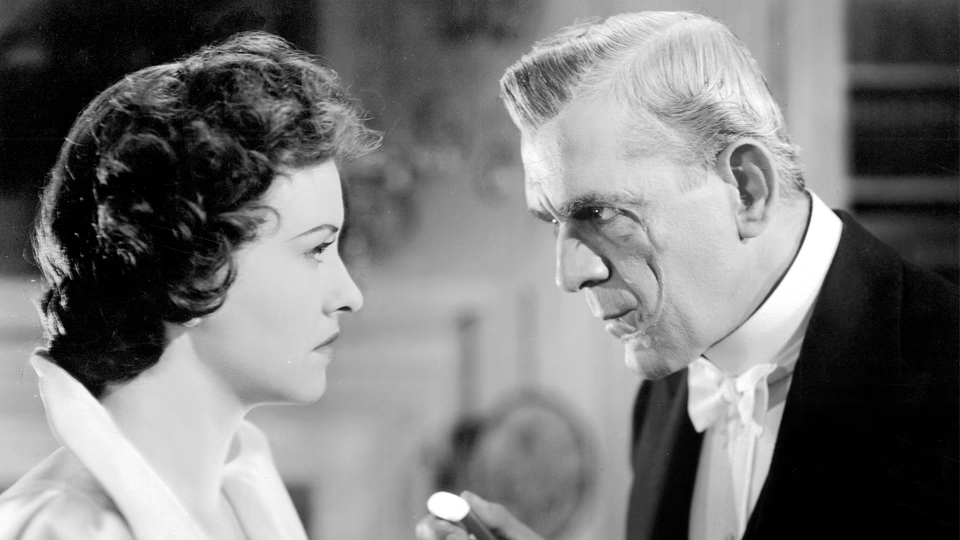British Intelligence

Fair warning, I’m going to spoil the entire plot of British Intelligence. How else to review this espionage drama? Plot is all it offers.
In 1917, amid World War I, the British are hurting. Every plan leaks to the Germans. The British suspect the notorious German spy Strendler has infiltrated their organization, but no one can identify him. Desperate to weed out Strendler, the British recall their best agent from undercover duty.
This plan also leaks to the Germans, who kill the British agent and shoot down his extraction plane.
The pilot, Frank Bennett, survives. In a French hospital, a nurse named Helene, played by Margaret Lindsay, tends to him. There’s an attraction between the two, but Helene says she has to leave.
Helene turns out to be a German spy. She’s recalled to headquarters, given a commendation and a new assignment. Posing as a refugee, she’s tasked to infiltrate the house of British cabinet minister Arthur Bennett, who she recognizes as Frank‘s father.
Helene ingratiates herself with the Bennett family. Her German contact is the family butler Valdar, played by Boris Karloff. Unbeknownst to Helene, Valdar is a double-agent, reporting to the head of British Intelligence.
Some sloppy code-passing by Helene arouses the suspicions of British Intelligence. They set a trap involving a would-be German agent, but Helene sees through it, maintaining her cover.
Frank returns home and recognizes Helene. She tells Frank she’s an undercover British agent. Valdar overhears this and forces Helene into the cellar at gunpoint. Helene claims she invented the British agent story to allay Frank‘s suspicions. Valdar doesn’t believe her, but relents after seeing her German commendation.
Valdar reveals he is Strendler. Further, the British cabinet is meeting upstairs and he’s planted a bomb to level the house under the guise of a Zeppelin bombing. He’s even stolen plans for the next British offensive.
But the authorities had suspected Valdar and kept him under surveillance. They rush into the cellar and defenestrate the bomb, but Valdar flees with the plans. He’s shot during his escape but makes it to a German safe house. Just as German agents prepare to transmit the British plans, a Zeppelin bomb levels the building.
That’s a lot of plot. The labyrinthine twists of agents, double agents, and triple agents leave little room for characterization. As Helene, Lindsay functions not as a character with feelings and nuance, but a plot device to drive the mystery of Strendler’s identity. As Valdar, Karloff flips between caricatural French butler, cartoonish German villain, and obsequious British agent. But maybe this is by design. Characterization requires plausibility, and British Intelligence has none.
Take Valdar’s big reveal that he is Strendler. If Valdar was a British agent, he would have told the British about Helene, making the ruse involving the fake German agent unnecessary. But, if Valdar didn’t tell the British about Helene, how did they know her handler‘s code phrases? This film even acknowledges this bit of inanity at the end with the British Intelligence lead saying, “We almost overplayed our parts trying to be too clever.” Indeed.
And how did Valdar gain so much guarded information? His espionage consists of little-more than eavesdropping outside thin doors or open windows.
Worst of all, British Intelligence drags. The film betrays its origins as a 1918 stage play, with characters verbalizing every thought and emotion, necessitating reams of dialogue delivered in static two-shots.
Even the structure disappoints. Why open with a lengthy sequence introducing Frank, only to have him disappear? Why not start with Helene undercover? She’d be a sympathetic character until her reveal as a German spy, which would have surprised.
British Intelligence may be overlong and beset with plot holes, but at least it features an interesting performance from Karloff. He never convinces in what amounts to a triple role—his French accent alone is cringe-worthy—but it’s nice seeing him work outside the horror genre. I can’t recommend it, though Karloff fans may enjoy it as a curiosity.